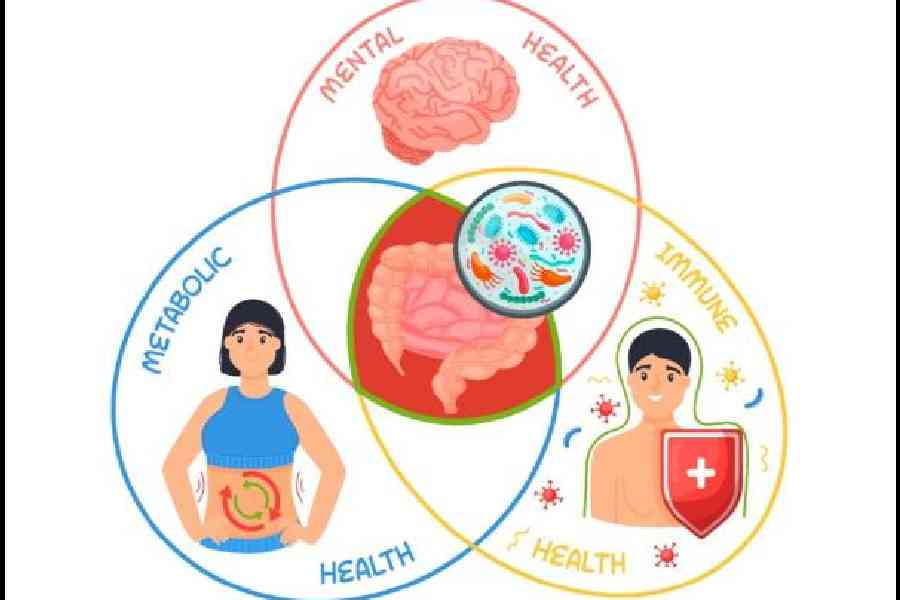Our bodies are open to the environment at two ends — the mouth and the anus — connected by 10 to 15 feet of intestines — a long, hollow pipe. From birth, this internal environment houses trillions of microorganisms collectively known as the gut microbiome.
Babies are exposed to microorganisms when they swallow amniotic fluid in the womb. During a vaginal birth, they also ingest secretions from the birth canal. By the time a baby is born, its intestine already contains bacteria, viruses and even fungi. These organisms, thriving in the warm, nutrient-rich environment of the gut, begin to multiply and establish themselves rapidly.
Within 24 hours after birth, the composition of the gut microbiome is established, initially shaped by the mother’s microbiota. Over time, this microbial community is influenced by diet, environment and lifestyle.
The gut microbiome functions almost like a separate entity, living in symbiosis with its human host. These microorganisms work to maintain a mutually beneficial relationship, contributing to many essential bodily functions.
The gut flora assists in breaking down food components the human body cannot digest alone, such as complex carbohydrates. The microbiome also keeps the intestinal environment slightly acidic, helping defend against harmful bacteria.
Another crucial role is the production of vitamins. Essential vitamins, such as Vitamin K (for blood clotting) and biotin (for healthy skin and hair), are produced by gut bacteria. These vitamins may be scarce in the diet or destroyed by cooking or by stomach acid, so the microbiome fills the gap.
Remarkably, the gut microbiome also communicates with the brain, influencing both physical and mental health. By releasing various chemicals, gut bacteria regulate appetite, often driving cravings and food choices. They also produce neurotransmitters like serotonin, GABA and butyrate, which directly affect mood, impacting conditions such as anxiety, depression and even neurological diseases like Parkinson’s and Alzheimer’s.
Maintaining a healthy gut microbiota is essential. Imbalances in gut flora can lead to metabolic disorders and may increase appetite, potentially contributing to obesity. Disruptions, caused by antibiotics, alcohol or tobacco, can damage healthy bacteria and allow harmful bacteria to flourish. It’s critical to use antibiotics responsibly — following the prescribed dosage and duration — to avoid promoting antibiotic-resistant bacteria.
A diverse, balanced microbiome can reduce the risk of metabolic diseases, obesity, inflammation and even cancer. Whole, plant-based foods — vegetables, fruits, whole grains, legumes and nuts — are essential to supporting a healthy gut. Processed foods with added sugar, salt, preservatives and unhealthy fats can harm the gut flora. Aim for four to six servings of fresh fruits and vegetables daily, and include fermented foods like curd, which provide beneficial bacteria.
Athletes tend to have healthier and more diverse gut microbiota. Physical activity, especially aerobic exercises like brisk walking, increases the population of beneficial bacteria. Always combine aerobic activities with anaerobic exercises.
Eating habits should be regular. Take around 20 minutes a meal, chew food thoroughly and do not combine meals with distractions like the phone and television. Fasting can also promote healthy gut bacteria. Avoid constant snacking and implement a 12 to 16-hour fast overnight. It gives the gut time to rest and supports the growth of beneficial microorganisms.
Though we think of the brain as the body’s control centre, the gut — through its vast microbiota network — plays a decisive role in regulating health. From metabolism to mood, the gut microbiome is a key player in ensuring our overall well-being.
The writer has a family practice at Vellore and is the author of Staying Healthy in Modern India. If you have any questions on health issues please write to yourhealthgm@yahoo.co.in










